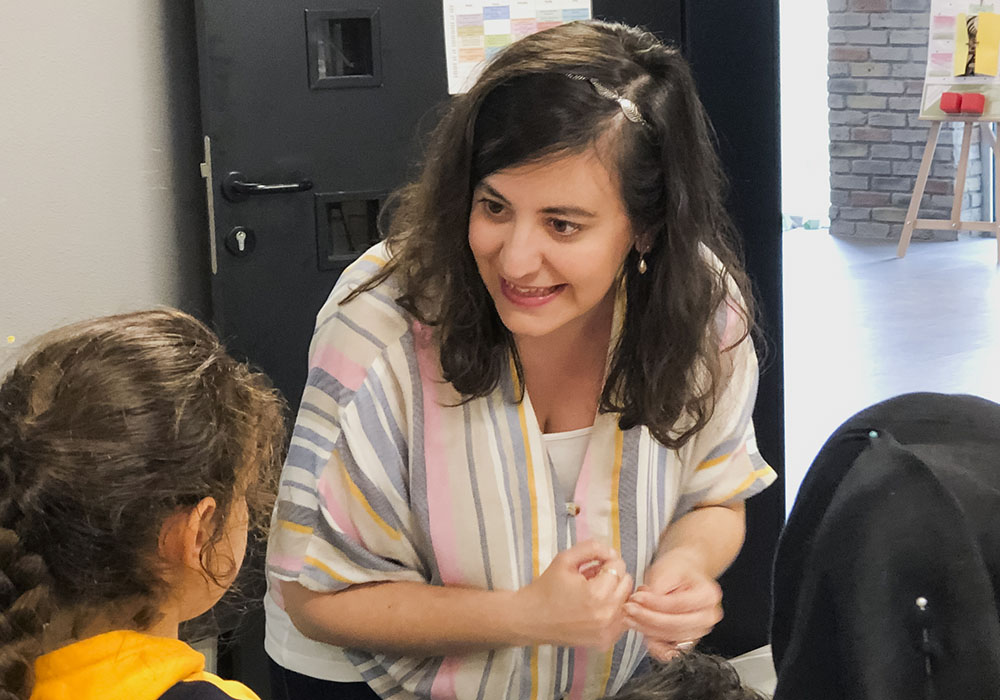Millions of shell-shocked refugees from the Syrian civil war now live in Turkey, where virtually no one speaks their language. Many of the youngest have witnessed unspeakable violence even before starting kindergarten.
As the children struggle to assimilate, University of South Carolina College of Education associate professor Elif Karsli-Calamak has been leading grant-funded support for educators in Turkey who — without adequate resources and specialized training — face crushing disadvantages teaching them.
“Eventually the children end up in public schools,” Karsli-Calamak explains. “In some cases, teachers have around 20 refugees in one class. Many of the kids have been through quite challenging experiences. They have seen war.”
Born in Turkey, Karsli-Calamak came to the United States on a Fulbright Scholarship and completed her doctorate in early childhood education. Her first research project in Turkey, from 2017 to 2019, provided support for 30 teachers of children in kindergarten through third grade and was funded by Turkey’s National Science Foundation (TÜBİTAK).
Karsli-Calamak has a natural affinity for her native country, so conducting this research was personally meaningful to her.
“My family has an immigrant history. We lived in Germany when I attended kindergarten,” she says. “When I came to the United States to do my Ph.D., I worked on a project with Latino communities. Those experiences enhance my interest in and sensitivity to multicultural issues.”
“Many of the kids have been through quite challenging experiences. They have seen war.”
Turkey is home to the highest number of Syrian refugees in the world — 4 million, by some estimates. Not only do the Arabic-speaking Syrian children not understand Turkish, but some are living with the emotional challenges of post-traumatic stress. In addition, Turkey has struggled with a post-pandemic economic crisis and, later, a devastating earthquake, which have added to the teachers’ personal challenges.
Furthermore, state-employed teachers participating in Karsli-Calamak’s research were not allowed to receive any funding or compensation from the research grant. They were invited to participate voluntarily but were not paid for the extra time and effort they invested, making their commitment to teaching the refugee children all the more remarkable.
“We wanted to make sure the teachers were not feeling overwhelmed and burned out,” Karsli-Calamak says. “These are monolingual curriculums, all in Turkish. The teachers often were not well-prepared to teach in culturally and linguistically diverse classrooms and didn’t speak any Arabic.”
Karsli-Calamak says the most valuable result (and a proven best practice) from her work was intentionally creating community among the public-school teachers, helping them bond and establish a close support network of peers.
“A lot of the time, they were just by themselves dealing with this huge teaching challenge,” she explains. “We brought those teachers together. The teachers commented on feeling better knowing they were not alone.”
She was quick to point out that the teachers are ordinary people, some holding common cultural biases or internalized negative stereotypes about refugee populations.
“They are human, with perspectives that are constantly evolving. What is important here is to create spaces and opportunities to deconstruct these stereotypes,” she notes.
A second grant project, this time funded by the European Commission and TÜBİTAK from 2021 to 2023, supported a smaller cohort of six teachers so Karsli-Calamak could more closely examine their dedication and motivation.
“I wanted to understand what makes them unique and different,” she says. “These teachers were interested in social justice issues and what was going on in Turkey and beyond, raising concerns about anti-immigrant discourses, politicized aspects of immigration and refugees, and critical questions about where refugees belong. They were highly engaged teachers.”
Karsli-Calamak’s early childhood education concentration has been in mathematics, and in these grants, she focused teaching strategies on basic mathematics, a discipline many consider to be a universal language.
“That’s true to some extent,” she says, “but we still depend on (spoken and written) language. And culture is a big part of it. … Math connects us easier than other subjects. The children basically understand and communicate the numbers and shapes. From those basics, we build a familiarity that they can build on.”
“We wanted to make sure the teachers were not feeling overwhelmed and burned out.”
Grant deliverables for these research projects were mostly qualitative. Karsli-Calamak and her research team wrote and published detailed articles in highly regarded professional journals about what they were learning.
“We do lots of dissemination activities, talks and seminars,” Karsli-Calamak says. “Some institutions have expressed interest in possibly replicating what we do.”
Asked to recall a truly meaningful experience from this research, Karsli-Calamak smiled.
In an effort to engage Syrian families with their children’s education, she began planning multilingual family mathematics workshops and was met with some unexpected push-back.
“Our teachers were skeptical. They insisted the Syrian families wouldn’t show up, that they didn’t care. I said, let’s try it anyway,” she recalls. “What we found was they (parents and families) wanted to come. They wanted to participate. The first day of workshops, they all showed up. We played games together. And at the end of the day, I remember the teachers admitting they had been wrong. They were so surprised. It was not that difficult to deconstruct stereotypes.”
The simple act of bringing in families for the workshops became one of the project’s best practices, because it afforded parents the opportunity to actively partner in their children’s education. The workshops’ engagement with families made a lasting impression on the teachers.
“The teachers came to appreciate how families could be a resource to them, giving them keen insights that allowed them to better help refugee children succeed in the classroom.”
Editor's note: Turkey changed the spelling of its name to Türkiye in 2021, and the United Nations adopted the new spelling in 2022. USC's Division of Communications and Marketing follows a modified form of Associated Press Style, which uses the spelling Turkey.
